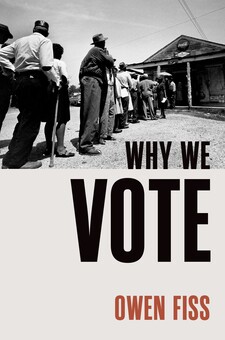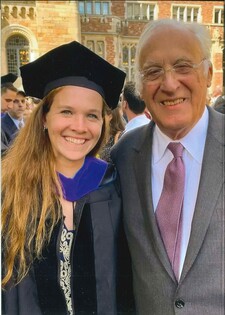Professor Owen M. Fiss on the Importance of Voting

It was the spring semester of 2020. Sterling Professor Emeritus of Law Owen M. Fiss was teaching his class A Community of Equals, engaging students in discussions on civil rights laws pertaining to various topics, including voting. Fiss, who helped implement civil and voting rights laws in the 1960s, left the classroom discussion inspired and resolved to write his newest book, Why We Vote.

Shortly after, Fiss found himself not only with an idea but a newfound abundance of time to write due to the COVID-19 pandemic. His work would prove to be timely, as the 2020 presidential election and Jan. 6, 2021 insurrection unfolded while penning the book.
Fiss starts by outlining why the U.S. Supreme Court has a responsibility to uphold the democratic ideal of the Constitution, then delves into recent events that have threatened it.
In the introduction, Fiss stresses the importance of voting, writing, “Unlike the mob that stormed the Capitol on Jan. 6, 2021, those who do not vote or refrain from voting do not threaten violence. Nor do they obstruct the functioning of a governmental institution. Yet through their inaction, they too impair the political freedom of America that arises from the democratic character of its government and thus violate their elemental duty of citizenship. We vote to preserve democracy and thus our own freedom.”
Each chapter in Why We Vote focuses on Supreme Court cases that sought to enlarge the freedom that democracy generates, pointing to rulings that allowed citizens to vote, facilitated the exercise of their right to vote, ensured the equality of votes, and provided feasible access to the ballot for independent candidates and new political parties.

In a concluding chapter, Fiss writes, “The right to vote is the means by which the ruled participate in the process of selecting their rulers and thus is essential for the fulfillment of the democratic purpose of the Constitution. It presumes that one person’s right to vote is as worthy as another’s.”
Fiss credits Cara Meyer ’22, one of the students from his A Community of Equals class, for her role in the discussion that led to Why We Vote and for serving as his editor and research assistant.
Owen Fiss joined the Yale faculty in 1974. In addition to teaching at the School for 50 years, Fiss co-directs the Abdallah S. Kamel Center for the Study of Islamic Law and Civilization and helped found YLS programs on Latin America and the Middle East. In the beginning of his career, he clerked for Thurgood Marshall and William J. Brennan Jr. and served in the Civil Rights Division of the Department of Justice from 1966 to 1968. He is also a member of the American Academy of Arts and Sciences and was awarded the Phillips Prize in 2020 by the American Philosophical Society for his lifetime achievement in jurisprudence.
Fiss’s countless articles as well as other works include The Civil Rights Injunction, Troubled Beginnings of the Modern State, The Structure of Procedure (with Robert Cover), Procedure (with Robert Cover and Judith Resnik), Liberalism Divided, The Irony of Free Speech, A Community of Equals: The Constitutional Protection of New Americans, A Way Out: America’s Ghettos and the Legacy of Racism, Adjudication and its Alternatives (with Judith Resnik), The Law as It Could Be, The Dictates of Justice: Essays on Law and Human Rights, A War Like No Other: The Constitution in a Time of Terror, and Pillars of Justice: Lawyers and the Liberal Tradition.


